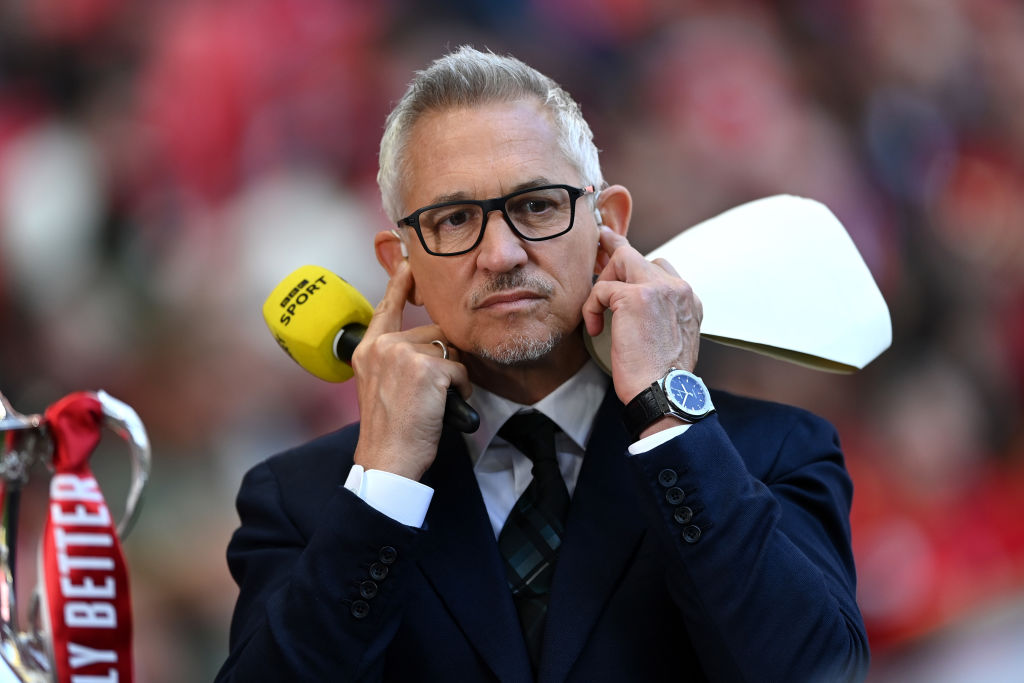[ad_1]
A whole rebellion at the heart of British culture. For the first time in six decades, soccer fans had to watch their favorite show Match of the Day (The Match of the Day) without commentators or commentators. The BBC’s suspension of presenter Gary Lineker was to blame. for rejecting on his Twitter account the immigration reform proposed by the Conservative Government British, comparing it to the language of the Nazis. They only showed the images of the goals and the most impressive moments of the footballers on the fieldbecause many analysts and players made it clear that they did not want to give interviews to the sports flagship of the public chain.
Was a spontaneous strike to support a much-admired ex-footballer, a man often described as “a centrist father”, and to defend the independence of the institution nicknamed “la Tita”. And they have been crazy days after Lineker’s tweets, with journalists from the same BBC making canutes outside the house of their highest paid presenter.
The debate over whether Gary Lineker has broken the “proper” impartiality code has dominated news on the BBC and its rival networks. Having to weather the demands of its editorial standards, talent and audiences, the BBC “walks a tightrope”, wrote the media and culture reporter for the house, Katie Razzall. For one thing, she explains to herself, Lineker is a freelancer and did not comment on Match of the Day. On the other hand, Razzall points out that the current rules specify that “people with social platforms have a greater responsibility to maintain impartiality.” AND Lineker has almost nine million followers on Twitter.
The BBC’s current guidelines when it comes to social media are far from clear
This crisis has shown many journalists that the BBC’s current guidelines when it comes to social media are far from clear. Before Lineker’s suspension, John Humphrys, a former host of the influential show Today of BBC Radio 4, had already targeted that the general manager of the chain, Tim Davie, was taking time to clarify them.
Lineker’s case has been interpreted by many as a capitulation to the extreme right of the Conservative Party, among which are many of those who want to end the license paid by citizens to finance public television. They emphasize that Davie ran for the Conservatives in a municipal election and that the current president of the BBC, Richard Sharp, donated more than 400,000 euros to the ruling party and facilitated a loan of 800,000 euros to former Prime Minister Boris Johnson.
In addition, the BBC he has not punished many other personalities who work on his shows and who have posted very political tweets. Prominent among them is Sir Alan Sugar, the businessman who presents The Apprentice (The newbie) and who criticized former Labor leader Jeremy Corbyn, even recommending voting for Boris Johnson, to say in August 2022 that Johnson should go to jail for his alleged lies during the Brexit campaign.

The crisis ended this Monday with Davie’s announcement that Lineker will return to Match of the Day this weekend and that there will be a reviewprepared by an independent expert, of the guidelines on the use of social networks. Lineker, for his part, thanks him, noting that Davie has an “almost impossible job, keeping everyone happy, especially in the field of fairness.”
Also, I’d like to thank Tim Davie for his understanding during this difficult period. He has an almost impossible job keeping everybody happy, particularly in the area of impartiality. I am delighted that we’ll continue to fight the good fight, together.
—Gary Lineker 💙💛 (@GaryLineker) March 13, 2023
Former BBC news director James Harding has recommended that public television be “clear about the strictness of the rules for news journalists… and respect for free speech outside the BBC“.
“You cannot enter a world where the BBC controls the opinions of every writer, director, musician, celebrity, athlete, scientist or businessman,” he concludes.
[ad_2]



